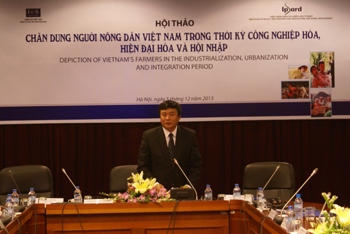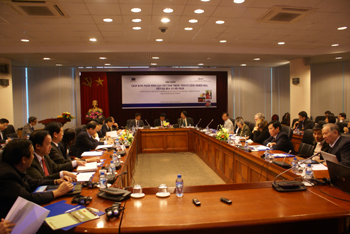|

|
Prof. Dr. Nguyen Xuan Thang, President of Vietnam Academy of Social Sciences (VASS) making the opening speech |
|
Participating in the conference, there were Prof.Dr. Nguyen Xuan Thang, Member of the Central Committee of Communist Party and President of Vietnam Academy of Social Sciences (VASS), Assoc.Prof.Dr. Dang Nguyen Anh, Director of the Institute of Sociology, Dr. Dang Kim Son, Director of the Institute of Policy and Strategy for Agriculture and Rural Development (IPSARD); Mr. Pham Quoc Doanh, Deputy Director of the Department of Enterprise Development and Renovation (the Parliarment Office); Mr. Nguyen Quoc Cuong, Chairman of Vietnam Farmers Association; Mr. Ho Xuan Tung, Former Deputy Minister of Agriculture and Rural Development; Mr. Nguyen Dang Khoa, Former Deputy Minister of Agriculture and Rural Development; and many others from Vietnam Academy of Social Sciences, the Ministry of Agriculture and Rural Development, Vietnam Farmers Association, and instutions of different ministries and sectors as well as universities in Hanoi.
At the opening speech, Prof.Dr. Nguyen Xuan Thang stated that it was the first conference that focused directly on the depiction of farmers in the period of two important landmarks: firstly, it was nearly 30 years since we started Doi moi; and secondly, we were making a summary for 5 years of implementation of the Resolution No.26/NQ-TW issued by the Central Committee of Communist Party on agricultural, rural and farmers’ issues. In this conference, it is necessary to make a very appropriate recognition of farmers’ portrait. Doi moi has been carried out for nearly 30 years; our country has therefore gained positive achievements, leading to considerable changes in the rural appearance as well as the portrait of farmers. After starting the market economy and international economic integration, we got new development approaches and obtained significant results in the agricultural and rural sector; the standard of living, income and especially poverty reduction in rural areas have been much improved. The key role of farmers in our successes throughout the history and the two wars of resistance against the French colonialists and American imperialists must be recognized scientifically and objectively. Our country is now carrying out the transformation of market economy and international integration, accelerating the process of industrialization and modernization. What are emerging issues that farmers face in this process? Resolutions, strategies and policies relating to agriculture, rural areas and farmers are issued and implemented relatively consistently. Many contents of the Resolution No.26/NQ-TW have been concretized, causing direct impacts on farmers. One of the exampples is the implementation of building a new rural life. It is necessary to make clear the subject role of farmers. What role do farmers play in the economic restructuring? In this conference, we have to outline and describe successfully the image and position of farmers, while viewing them as the key subject in issues involved with agriculture, rural and farmers. It is essential to look at farmers in a multidirectional and multifaceted relationship in order to depict correctly the image of farmers in the period of industrialization, modernization and international integration in the country.

Four papers were presented, including: “Scientific and Technological Application from the perspective of farmers” (by Dr. Tran Cong Thang, the Institute of Policy and Strategy for Agriculture and Rural Development (IPSARD); “A picture of poverty and social institutions in rural development and poverty reduction” (Mr. Hoang Xuan Thanh, Representative of Oxfam Research Team); “Actual status of socio-cultural life of rural people in Vietnam from 2008 to 2013” (Assoc. Prof., Dr. Bui Quang Dung, the Institute of Sociology, Vietnam Academy of Social Sciences); and “Portrait of Vietnam farmers (Dr. Nguyen Do Anh Tuan, the Institute of Policy and Strategy for Agriculture and Rural Development , the Ministry of Agriculture and Rural Development).
According to Assoc. Prof. Dr. Bui Quang Dung, it is necessary to see agricultural restructuring as the spearhead and key factor for poverty reduction and income improvement, attaching special importance to development of non-agricultural economic sectors in the rural, forming service sectors, and creating additional jobs and traditional trade villages. Poverty reduction policies and measures must focus on remote and mountainous areas, particularly villages of great difficulty. Specifically, it is essential to develop new ways to organize rural trading and production activities (especially the type of a new collective) in order to take full advantage of all resources to provide occupational training for rural laborers. At present, the political system in the rural has been strengthened and reinforced; the political security and social order have been much better. These achievements are not, however, corresponding to the potential and advantages of the country and the rural as well.
According to Mr. Hoang Xuan Thanh, in the meanwhile, it is necessary to form informal and semi-formal groups of farmers, based on the actual demands for linkages and cooperation among farmers, in order to make a contribution towards improvement of their living standard and poverty reduction. Furthermore, it is necessary to develop collectives of new types, from which collective members can benefit. Enterprises also need to expand markets for agricultural products of ethnic minorities, based on the principle of mutual interest.
Mr. Nguyen Quoc Cuong assumes that farmers need to meet requirements of industrialization and modernization such as high technical qualifications and good skills; i.e. they have to equip themselves with proper knowledge of production and market economy; they have to know how to use the computer, how to apply technology and linkages in trading and production. Besides, they need to know how to preserve and promote the national cultural tradition; they need to take part in environmental protection and keep the neighborhood relationships …
From the conference presentations and disussions, we can realize that farmers’ life has been improved significantly for the past time, in general. This can be shown through the rapid increase in household income and expenditure for the period 2006-2010. The income of farmers from agricultural sources has gradually reduced; whereas, their wage has slightly increased and their income from informal sources has been getting higher. Farmers’ access to infrastructure and public services has been improved. Other areas such as cultural life, education and social security have been also enhanced. Households that take part in social organizations, especially the Women’s Union and the Farmers Association, make up a relatively high proportion. However, the rate of poverty reduction is not equal between local areas or between different ethnic groups of people. The rate of poverty reduction is likely to slow down and the proportion of households that fall back to poverty seems to be higher. The increase in household income and expenditure tends to slow down recently. The urban – rural gap as well as the inequality within the rural has not been much improved.
Recommendations and comments made by the conference participants are collected by the conference organizing board in order to provide policy-makers with comprehensive information on Vietnam’s farmers so that appropriate policies will be issued to let farmers become a real subject of development.
Nguyen Thu Ha







